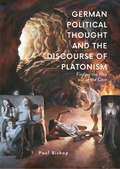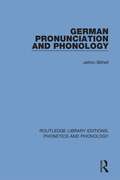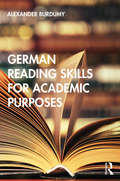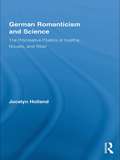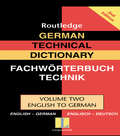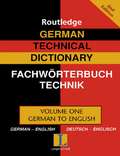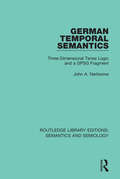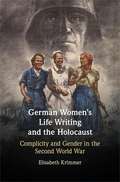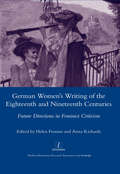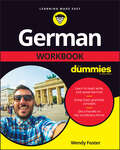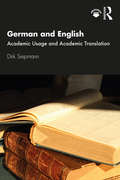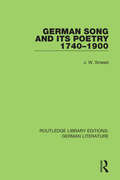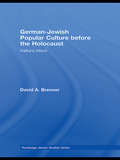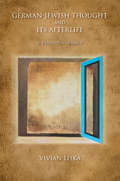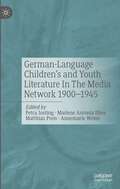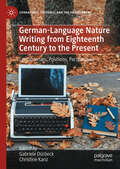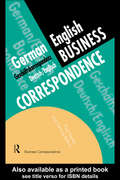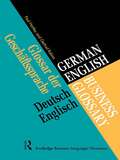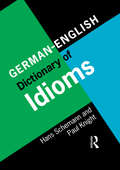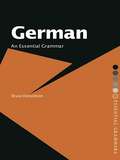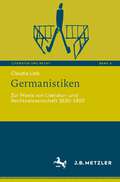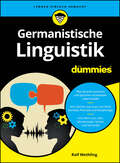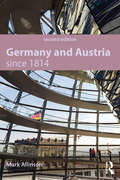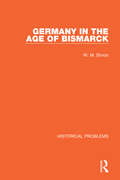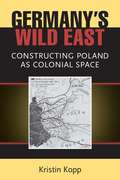- Table View
- List View
German Political Thought and the Discourse of Platonism: Finding the Way Out of the Cave
by Paul BishopTaking Plato’s allegory of the cave as its starting-point, this book demonstrates how later European thinkers can be read as a reaction and a response to key aspects of this allegory and its discourse of enchainment and liberation. Focusing on key thinkers in the tradition of European (and specifically German) political thought including Kant, Marx, Hegel, Nietzsche, Heidegger, and the Frankfurt School, it relates them back to such foundational figures as Rousseau, Aristotle, and in particular Plato. All these thinkers are considered in relation to key passages from their major works, accompanied by an explanatory commentary which seeks to follow a conceptual and imagistic thread through the labyrinth of these complex, yet fascinating, texts. This book will appeal in particular to scholars of political theory, philosophy, and German language and culture.
German Pronunciation and Phonology (Routledge Library Editions: Phonetics and Phonology #2)
by Jethro BithellFirst published in 1952. This book does not confine itself to German phonetics; it aims rather at showing by what processes and tricks of sound words have been shaped in the course of years; it is therefore a book on phonology as well. It should have a wide appeal to students of German. Moreover, since the treatment of laws and sound processes is comparative, it will be useful to students of other languages, particularly of the Scandinavian group and Dutch.
German Reading Skills for Academic Purposes
by Alexander BurdumyGerman Reading Skills for Academic Purposes allows researchers and learners with no prior understanding of German to gain an understanding of written German at CEFR C2/ACTFL Intermediate-High level that will allow them to read a variety of German texts, including research articles and monographs. This is achieved by looking closely at the elements of German grammar required for the understanding of written German along with practical advice and observations. One of the main themes running through the textbook is that it uses a toolkit approach that puts deductive reasoning and decoding skills at its heart to allow learners to engage with a wide variety of texts.
German Romanticism and Science: The Procreative Poetics of Goethe, Novalis, and Ritter (Routledge Studies in Romanticism)
by Jocelyn HollandSituated at the intersection of literature and science, Holland's study draws upon a diverse corpus of literary and scientific texts which testify to a cultural fascination with procreation around 1800. Through readings which range from Goethe’s writing on metamorphosis to Novalis’s aphorisms and novels and Ritter’s Fragments from the Estate of a Young Physicist, Holland proposes that each author contributes to a scientifically-informed poetics of procreation. Rather than subscribing to a single biological theory (such as epigenesis or preformation), these authors take their inspiration from a wide inventory of procreative motifs and imagery.
German Technical Dictionary (Volume 2)
by RoutledgeSince its publication in 1995, the German Technical Dictionary has established itself as the definitive resource for anyone who needs to translate technical documents between German and English. This new edition has been substantially revised to reflect the technological environment of the 21st century. The revised edition contains over 75,000 entries, of which over 5,000 are new, with many new entries in the areas of: * the internet and telecommunications * bio-technology and the new genetics * new developments in health technology Throughout this dictionary continues to benefit from the features that made the first edition so valuable, including accurate translations in British and American English and an attractive, durable and easy to use layout.
German Technical Dictionary: Universal-worterbuch Der Technik Englisch (Routledge Bilingual Specialist Dictionaries Ser.)
by RoutledgeSince its publication in 1995, the German Technical Dictionary has established itself as the definitive resource for anyone who needs to translate technical documents between German and English.This new edition has been substantially revised to reflect the technological environment of the twenty-first century. The revised edition contains over 75,000 entries, of which over 5,000 are new, with many new entries in the areas of:* the Internet and telecommunications* bio-technology and the new genetics* new developments in health technology.Throughout, this dictionary continues to benefit from the features that made the first edition so valuable, including accurate translations in British and American English and an attractive, durable and easy to use layout.
German Temporal Semantics: Three-Dimensional Tense Logic and a GPSG Fragment (Routledge Library Editions: Semantics and Semiology #10)
by John A. NerbonneFirst published in 1985, this book analyses temporal meaning in German. The framework is that of a model-theoretic semantics, more specifically one incorporating a multi-dimensional tense logic. The first chapter presents this logic and argues that three dimensions are optimal for the description of natural language temporalia. The second chapter applies this theory to the analysis of temporal meaning in German. Frame adverbials, the Present and Past Tenses, duratives, aspectual adverbials using in, and the adverbials particle schon are examined. Chapter 3 provides a formal syntax to bear the semantic analysis proposed in the second chapter and the final chapter explores syntactic and semantic extensions of the fragment, showing how the Perfect, the particle noch, the passive, and a distinct reading of frame adverbials may be accommodated.
German Women's Life Writing and the Holocaust: Complicity and Gender in the Second World War
by Elisabeth KrimmerThis important study examines women's life writing about the Second World War and the Holocaust, such as memoirs, diaries, docunovels, and autobiographically inspired fiction. Through a historical and literary study of the complex relationship between gender, genocide, and female agency, the analyzes correct androcentric views of the Second World War and seek to further our understanding of a group that, although crucial to the functioning of the National Socialist regime, has often been overlooked: that of the complicit bystander. Chapters on army auxiliaries, nurses, female refugees, rape victims, and Holocaust survivors analyze women's motivations for enlisting in the National Socialist cause, as well as for their continuing support for the regime and, in some cases, their growing estrangement from it. The readings allow insights into the nature of complicity itself, the emergence of violence in civil society, and the possibility of social justice.
German Women's Writing of the Eighteenth and Nineteenth Centuries: Future Directions in Feminist Criticism
by Helen FroniusGerman women writers of the eighteenth and nineteenth centuries have been the subject of feminist literary critical and historical studies for around thirty years. This volume, with contributions from an international group of scholars, takes stock of what feminist literary criticism has achieved in that time and reflects on future trends in the field. Offering both theoretical perspectives and individual case studies, the contributors grapple with the difficulties of appraising 'non-feminist' women writers and genres from a feminist perspective and present innovative approaches to research in early women's writing. This inclusive and cross- disciplinary collection of essays will enrich the study of German women's writing of the eighteenth and nineteenth centuries and contribute to contemporary debates in feminist literary criticism. Anna Richards is Lecturer in German at Birkbeck College, University of London. Helen Fronius is College Lecturer in German at Keble College, University of Oxford.
German Workbook For Dummies
by Wendy FosterSprechen sie Deutsch? Learn this fun language with Dummies German Workbook For Dummies is for German beginners who want to get started learning the official language of 7 countries. Packed with foundational grammar and integrated vocab, German Workbook For Dummies will set new language learners on their way to an exciting experience learning this complex language. Inside, you'll find plenty of practice for an experience that supports how people learn languages most effectively. As you make your way through the workbook, your confidence will grow as you discover how to handle greetings and introductions, make small talk, and understand daily encounters... auf Deutsch! Practice your speaking and writing skills in German Grasp the basics of German grammar Learn functional vocabulary and common slang Complete exercises and activities to build your confidenceWith a little help from Dummies, you'll excel in your German studies.
German and English: Academic Usage and Academic Translation
by Dirk SiepmannGerman and English: Academic Usage and Academic Translation focuses on academic and popular scientific/academic usage.This book’s brief is both theoretical and practical: on the theoretical side, it aims to provide a systematic, corpus-based account of current academic usage in English and in German as well as of the translation problems associated with various academic genres; on the practical side, it seeks to equip academic translators with the skills required to produce target-language text in accordance with disciplinary conventions. The main perspective taken is that of a translator working from German into English, but the converse direction is also regularly taken into account. Most of the examples used are based on errors that occurred in real-life translation jobs. Additional practice materials and sample translations are available as eResources here: www.routledge.com/9780367619022.This book will be an important resource for professionals aspiring to translate academic texts, linguists interested in academic usage, translation scholars, and graduate and post-graduate students.
German and Song 1740 - 1900: 1740 - 1900
by John SmeedOriginally published in 1987, this volume charts the development of German song across a century and a half, relating it both to poetry and to the cultural scene in Germany. By emphasising genre rather than individual composers and while paying heed to acknowledged masterpieces – by quoting extensively from forgotten composers, the book avoids historical over simplification and arrives at a fuller picture of this rich tradition. In so doing, it uncovers much neglected material. The book investigates the relationship between German poets and composers and their native folk tradition. It further explores the interaction between convention and innovation and demonstrates how one poem can be interpreted quite differently by different composers. The book is accessible both to students of literature and music.
German-Jewish Popular Culture before the Holocaust: Kafka's kitsch (Routledge Jewish Studies Series)
by David A. BrennerDavid A. Brenner examines how Jews in Central Europe developed one of the first "ethnic" or "minority" cultures in modernity. Not exclusively "German" or "Jewish," the experiences of German-speaking Jewry in the decades prior to the Third Reich and the Holocaust were also negotiated in encounters with popular culture, particularly the novel, the drama and mass media. Despite recent scholarship, the misconception persists that Jewish Germans were bent on assimilation. Although subject to compulsion, they did not become solely "German," much less "European." Yet their behavior and values were by no means exclusively "Jewish," as the Nazis or other anti-Semites would have it. Rather, the German Jews achieved a peculiar synthesis between 1890 and 1933, developing a culture that was not only "middle-class" but also "ethnic." In particular, they reinvented Judaic traditions by way of a hybridized culture. Based on research in German, Israeli and American archives, German-Jewish Popular Culture before the Holocaust addresses many of the genres in which a specifically German-Jewish identity was performed, from the Yiddish theatre and Zionist humour all the way to sensationalist memoirs and Kafka’s own kitsch. This middle-class ethnic identity encompassed and went beyond religious confession and identity politics. In focusing principally on German-Jewish popular culture, this groundbreaking book introduces the beginnings of "ethnicity" as we know it and live it today.
German-Jewish Thought and Its Afterlife: A Tenuous Legacy
by Vivian LiskaInGerman-Jewish Thought and Its Afterlife,Vivian Liska innovatively focuses on the changing form, fate and function of messianism, law, exile, election, remembrance, and the transmission of tradition itself in three different temporal and intellectual frameworks: German-Jewish modernism, postmodernism, and the current period. Highlighting these elements of theJewish tradition in the works of Franz Kafka, Walter Benjamin, Gershom Scholem, Hannah Arendt, and Paul Celan, Liska reflects on dialogues and conversations between themandonthereception of their work.She shows how this Jewish dimension of their writings is transformed, but remains significant in the theories of Maurice Blanchot and Jacques Derrida and how it is appropriated, dismissed or denied by some of the most acclaimed thinkers at the turn of the twenty-first century such as Giorgio Agamben, Slavoj i ek, and Alain Badiou.
German-Language Children's and Youth Literature In The Media Network 1900-1945.
by Petra Josting Marlene Antonia Illies Matthias Preis Annemarie WeberWith the research of German-language children's and youth literature and its media associations in the period from 1900 to 1945 as well as the recording of all data in an online portal for research and visual analysis, an innovative contribution to the historiography of children's and youth literature is available. The introduction provides information on the criteria for inclusion, central sources, theoretical frameworks, and the spectrum of the media associations investigated. Part I assembles three overview articles on the media of radio, film and theater for children and young people as well as a contribution on the conception and development of the online portal. In the second part, 18 selected media alliances are presented, sorted into the categories pioneers conquer the new media - stage children migrate to radio and/or film - fairy tales in film and radio - classics in all media - school stories in the theater, book and on the screen - crime and scandal on the screen - political conquers book and film.
German-Language Nature Writing from Eighteenth Century to the Present: Controversies, Positions, Perspectives (Literatures, Cultures, and the Environment)
by Gabriele Dürbeck Christine KanzThis volume examines the topic of German-language nature writing in a broad historical context spanning more than two centuries. It brings together contributions on the debates of the category 'Nature Writing’ by numerous renowned international scholars. It discusses literary texts of natural history, nature exploration, nature poetry perception and reflection by German-speaking authors since the 18th century, including texts by Ulrike Draesner and on Esther Kinsky’s writing. The book asks whether the here discussed texts can, should, or may also be labeled as 'Nature Writing' and how this new perspective on German literary history might change traditional classifications such as “Naturlyrik” (nature poetry) in German literary history.
German/English Business Correspondence: Geschaftskorrespondenz Deutsch/Englisch
by Paul Hartley Gertrud RobinsGerman/English Business Correspondence is a handy reference and learning text for all who use written German. 80 written communications are simply presented covering memos, letters, faxes and resumes. The situations covered include: * arranging meetings * acknowledging orders * enquiring about products * applying for jobs With full English translations, this text is suitable for both students and professionals and can be used for either reference or class use.
German/English Business Glossary (Business Language Glossaries Ser.)
by Paul Hartley Gertrud RobinsThis is the essential reference companion to all who use German for business communication.Containing over 5000 words, this handy two-way A-Z glossary covers the most commonly used terms in business. It will help you to communicate with confidence in a wide variety of situations, and is of equal value to the relative beginner or the fluent speaker.Written by an experienced native and non-native speaker team working in business language education, this unique glossary is an indispensable reference guide for all students and professionals studying or working in business where German is used.
German/English Dictionary of Idioms: Supplement To The German/english Dictionary Of Idioms
by Hans SchemannThis unique dictionary covers all the major German idioms and is probably the richest source of contemporary German idioms available, with 33,000 headwords. Within each entry the user is provided with: English equivalents; variants; contexts and precise guidance on the degree of currency/rarity of an idiomatic expression. This dictionary is an essential reference for achieving fluency in the language. It will be invaluable for all serious learners and users of German. Not for sale in Germany, Austria and Switzerland.
German: An Essential Grammar (Routledge Essential Grammars)
by Bruce DonaldsonGerman: An Essential Grammar is a practical reference guide to the core structures and features of modern German. Presenting a fresh and accessible description of the language, this engaging grammar uses clear, jargon-free explanations and sets out the complexities of German in short, readable sections. Suitable for either independent study or for students in schools, colleges, universities and adult education classes, key features include: focus on the morphology and syntax of the language clear explanations of grammatical terms full use of authentic examples a detailed contents list and index for easy access to information. With an emphasis on the German native speakers use today, German: An Essential Grammar will help students to read, speak and write the language with greater confidence.
Germanistiken: Zur Praxis von Literatur- und Rechtswissenschaft 1630‒1900 (Literatur und Recht #4)
by Claudia LiebHaben die germanischen Götter die Poesie und das Recht erfunden? Kann man einen Text rekonstruieren wie eine Tat? Sind Juristen oder Philologen die besseren Leser? Ist der Wissenschaftler so genial wie der Dichter? ‒ Vor rund 400 Jahren befasste sich eine gelehrte Denkgemeinschaft mit deutschen Texten aus Literatur und Recht. Vor fast 300 Jahren wurden die Spezialisten des deutschen Rechts „Germanisten“ genannt und bald auch die Experten deutscher Literatur. Claudia Liebs Analyse der gemeinsamen Vorgeschichte von Literatur- und Rechtswissenschaft beschreibt erstmals die historischen Verflechtungen von philologischer und juristischer Germanistik.
Germanistische Linguistik für Dummies (Für Dummies)
by Ralf MethlingMüssen oder dürfen auch Sie sich in Ihrem Studium mit germanistischer Linguistik beschäftigen? Ralf Methling bringt mit anschaulichen Beispielen und verständlichen Erklärungen Leben in diese scheinbar trockene Materie. Er macht Sie mit den Teilbereichen der Linguistik vertraut: mit der Semiotik, die sich mit Zeichen, der Phonetik und Phonologie, die sich mit Lauten, der Morphologie, die sich mit Wörtern, und der Syntax, die sich mit Satzbau beschäftigt. Auch die Semantik, die Lehre der Bedeutung, und die Pragmatik, die sich dem sprachlichen Handeln widmet, lässt er nicht außen vor. Darüber hinaus zeigt er die historische Entwicklung der deutschen Sprache und streift dabei auch das Thema Sprachwandel. So gibt dieses Buch einen Rundumüberblick, deckt den Umfang einer einführenden Vorlesung ab und zeigt, wie spannend Linguistik sein kann.
Germany and Austria since 1814
by Mark AllinsonGermany and Austria since 1814 presents an accessible overview of the distinctive historical experiences undergone by both Germany and Austria during this period. ?Beginning in 1814 with the Congress of Vienna and ending two centuries later with the consequences and ongoing challenges of German and European unification, this book focuses on political history and traces the development of liberal parliamentary democracy in Germany and Austria through to the modern Federal Republic of Germany and Second Austrian Republic, contextualising the Nazi period in both countries. Particular emphasis has been placed on exploring major developments, their causes, and the relationships between them. Fully revised, this new edition has been expanded to include a new final chapter outlining developments in both Germany and Austria from 1990 to the current day, including recent elections, as well as modifications and updates to other earlier chapters. Features include: Nine chapters, each analysing a distinct historical period and providing a timeline of the key events for quick reference and orientation Overviews of the main developments in European and World history at the beginning of each chapter, providing international context crucial to a broader understanding of historical events Authentic extracts from contemporary German political texts in the original language Topics for discussion provided in every chapter A guide to further reading and key internet resources for further research A combined glossary of German terms. Germany and Austria since 1814 provides the essential historical context necessary for an understanding of these pivotal European countries today. It will be invaluable for undergraduate students taking courses in German, History and Area Studies.
Germany in the Age of Bismarck
by W. M. SimonOriginally published in 1968, this was the first time that a comprehensive selection of documents on Germany in the Age of Bismarck had been made available to students and other readers in the English language. The documents were chosen to illuminate not only Bismarck’s own personality and policies but also the nature of the problems he faced and the reactions of his contemporaries. The substantial introduction serves as a general background and guide to the documents, which are in the form of letters, essays, polemics, speeches, and memoirs, produced in the period itself. They allow the student to obtain a genuine first-hand insight into the workings of minds and institutions in Germany during three of the most eventful decades of her history.
Germany's Wild East: Constructing Poland as Colonial Space
by Kristin KoppIn the nineteenth and early twentieth centuries, representations of Poland and the Slavic East cast the region as a primitive, undeveloped, or empty space inhabited by a population destined to remain uncivilized without the aid of external intervention. These depictions often made direct reference to the American Wild West, portraying the eastern steppes as a boundless plain that needed to be wrested from the hands of unruly natives and spatially ordered into German-administrated units. While conventional definitions locate colonial space overseas, Kristin Kopp argues that it was possible to understand both distant continents and adjacent Eastern Europe as parts of the same global periphery dependent upon Western European civilizing efforts. However, proximity to the source of aid translated to greater benefits for Eastern Europe than for more distant regions.
